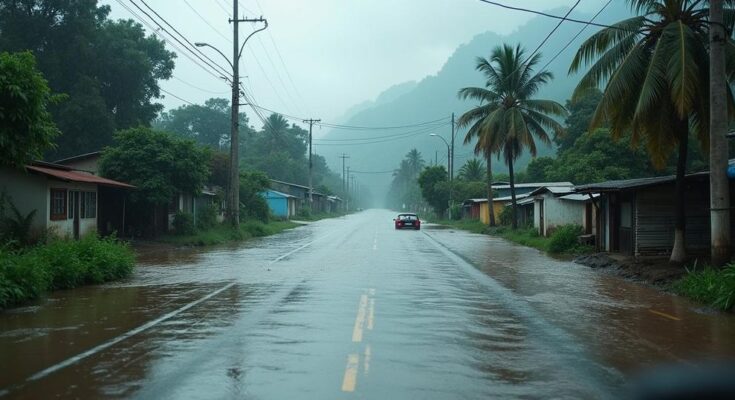Severe flooding in West and Central Africa, particularly in Maiduguri, Nigeria, has displaced over 400,000 people and resulted in at least 1,000 deaths this year. The disaster follows torrential rains and a dam collapse, significantly affecting the region’s infrastructure and humanitarian situations. Local and international relief efforts are ongoing, but associated challenges remain.
Severe floods continue to devastate northeastern Nigeria, exacerbated by torrential rains sweeping across West and Central Africa. As of midday Wednesday, the United Nations reported that over 400,000 individuals have been affected in the region. Aerial imagery revealed the overwhelming extent of the flooding, which has forcibly displaced countless people from their homes. In the city of Maiduguri, residents have witnessed harrowing scenes as houses collapse entirely under the deluge. Disturbingly, the rising waters have overwhelmed the city’s main prison, leading to chaotic escapes as inmates frantically fled. In this lethal combination of extreme weather and a damaged infrastructure, corpses of reptiles have mingled with human remains, all within once-bustling streets now rendered unrecognizable. The floods have claimed over 1,000 lives this year alone and displaced hundreds of thousands across central and West African nations, significantly affecting the populations of Chad, Nigeria, Mali, and Niger. The United Nations reports that over four million individuals have encountered flooding thus far this year—an increase that is threefold compared to the previous year. As crucial rescue operations continue in Maiduguri, accurate death tolls remain elusive due to the ongoing chaos. The U.N. has reported at least 230 fatalities in Nigeria, 265 in Niger, and 487 in Chad, with Mali suffering under its most severe inundation since the 1960s. While Africa contributes minimally to global greenhouse gas emissions, the region is increasingly vulnerable to extreme weather phenomena, as noted by the World Meteorological Organization. Adaptation costs in sub-Saharan Africa could reach between $30 to $50 billion annually over the next decade, indicating a pressing need for comprehensive strategies against climate change. By 2030, approximately 118 million individuals in Africa could be adversely affected by extreme weather events. Maiduguri, the capital of Borno state, finds itself grappling with additional crises. For a decade, the state has endured attacks from Boko Haram militants, with over 35,000 lives lost. 28-year-old resident Saleh Bukar recounted a vivid memory: “Water is flooding everywhere!”—a cry of alarm shared by neighbors in desperate need of escape. Tragically, those unable to awaken in time were lost to the waters. Local authorities are struggling to cope with the scale of this disaster. Reports indicate over 600,000 people in Borno state have been displaced, with at least 100 fatalities and 58 injuries claimed. The floods also wrought havoc at the Borno State Museum Park, claiming around 80% of its animals, leading to a mass escape of reptiles. Infrastructure has suffered immensely; the collapse of the local police station and damage to regional government offices compound the crisis. While external aid is forthcoming, with organizations like the World Food Program providing essential services, many survivors face challenges on all fronts. Harira Adamou, a single mother from Niger, found her home destroyed, recounting, “The rooms are destroyed; the walls fell down.” Added to this plight, Adamou lives in temporary shelter and fears future rains. In Maiduguri, approximately 15% of the city remains submerged, and with forecasts predicting further rainfall, authorities have issued warnings of impending floods. Bukar expresses the sentiment of countless displaced individuals: “I am volunteering to help, but I am also a victim. Our people need us. They need help.” The ongoing emergency demands urgent international support as local resources near exhaustion. Governor Babagana Zulum of Borno state has publicly requested assistance, stating: “Our resources are stretched to the limit, and we cannot do this alone.” As the floods continue to unfold, much work remains to aid in recovery and provide refuge for those in dire need amidst this devastating crisis.
The article discusses the severe flooding affecting West and Central Africa, particularly focusing on Maiduguri, Nigeria, which is experiencing catastrophic environmental challenges linked to torrential rains. The flooding follows a dam collapse and has led to a substantial loss of life, displacement of individuals, and overwhelming strain on local authorities and emergency services. This disaster occurs in a region already suffering from humanitarian crises, largely due to ongoing conflicts and now compounded by extreme weather conditions attributable to climate change. The United Nations and various humanitarian organizations are working to provide aid, while local victims reflect on their harrowing experiences.
The floods ravaging West and Central Africa have resulted in significant devastation, particularly in Maiduguri, Nigeria. With thousands displaced and over a thousand lives lost, the impact of severe weather exacerbates existing humanitarian crises in the region. Local authorities are overwhelmed, highlighting the urgent need for international support as they work to assist countless victims. Continued rains pose a further risk, urging a comprehensive response to address both immediate relief needs and the long-term implications of climate change in these vulnerable areas.
Original Source: apnews.com




